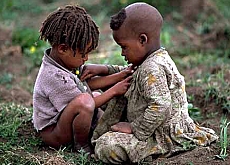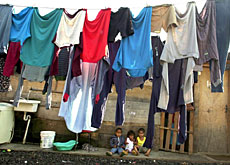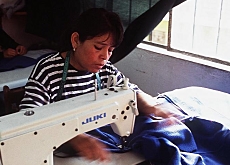Swiss fear lack of real progress at UN summit

On the eve of the biggest summit in United Nations history, the Swiss ambassador to the world body outlines to swissinfo his concerns for the meeting.
Peter Maurer, who has been involved in difficult negotiations on a final document, says a big question mark hangs over whether substantive progress can be made on a number of issues.
More than 170 heads of state and government are due in New York for the 2005 World Summit, which gets underway on Wednesday.
Ambassadors from more than 30 countries – including Switzerland – have been locked in tough negotiations for the past two weeks over a final document aimed at strengthening the world body and fighting poverty.
Nations have been sharply divided over tackling poverty, human rights, terrorism, nuclear proliferation, intervention in cases of genocide, and reforming the world body.
swissinfo: The United States has clearly set out to water down commitments on development aid and combating global warming. How can any effective progress be made as long as the world’s most powerful nation is refusing to play ball?
Peter Maurer: I think it is legitimate that each and every country makes clear what its positions are, and in that sense it is rather helpful that the United States has been clear in setting out where its priorities lie in these negotiations.
Many delegations, including ours, found it rather unfortunate that this positioning came late and in numbers of amendments which are difficult to digest at the present moment. So it has certainly complicated the finding of a consensus around the final document.
swissinfo: Switzerland has been instrumental in drafting reform of the Human Rights Commission. What progress has been made on the question of a new Human Rights Council?
P.M.: We will definitely be working hard to have a precise and ambitious mandate for a Human Rights Council adopted. But we also do realise that there is some opposition against and in that sense we are not yet sure where the consensus will fall in the end.
The real work in terms of having more precision on the mandate, the size, and the work of the council has to be decided upon by the 60th General Assembly and cannot really be on the agenda of the summit. The question is whether the summit will give sufficient clarity and direction to the negotiations that will be ongoing during the assembly.
swissinfo: Switzerland has been part of this core group of more than 30 countries which has been thrashing out this final document. What were you, as one of the UN’s younger members, able to bring to these negotiations?
P.M.: I think basically two things. There are areas in which we have – together with other delegations – been rather instrumental in fostering compromise language. This is true with regard to humanitarian action, to some elements of climate change, of sustainable development, and with regard to internally displaced persons.
On the second tier, we have been rather instrumental as advocates for some of the crucial elements and pillars of the reforms, including the Human Rights Council and getting a clear commitment to better oversight and better management in the secretariat.
swissinfo: How confident are you that come Friday the summit will have produced something meaningful?
P.M.: Well, I’m always confident. Once again the question is how substantive the result of the summit will be and how many leftovers we will have to work upon during the 60th General Assembly.
swissinfo-interview: Adam Beaumont in New York
The 2005 World Summit from September 14-16 at UN headquarters in New York is expected to bring together more than 170 heads of state and government – the largest gathering of world leaders in history.
The world body says it is a once-in-a-generation opportunity to take bold decisions in the areas of development, security, human rights and reforms of the UN.
Proposals call for breakthroughs in many areas to try to achieve the Millennium Development Goals, including cutting extreme poverty in half by 2015.

In compliance with the JTI standards
More: SWI swissinfo.ch certified by the Journalism Trust Initiative



You can find an overview of ongoing debates with our journalists here. Please join us!
If you want to start a conversation about a topic raised in this article or want to report factual errors, email us at english@swissinfo.ch.